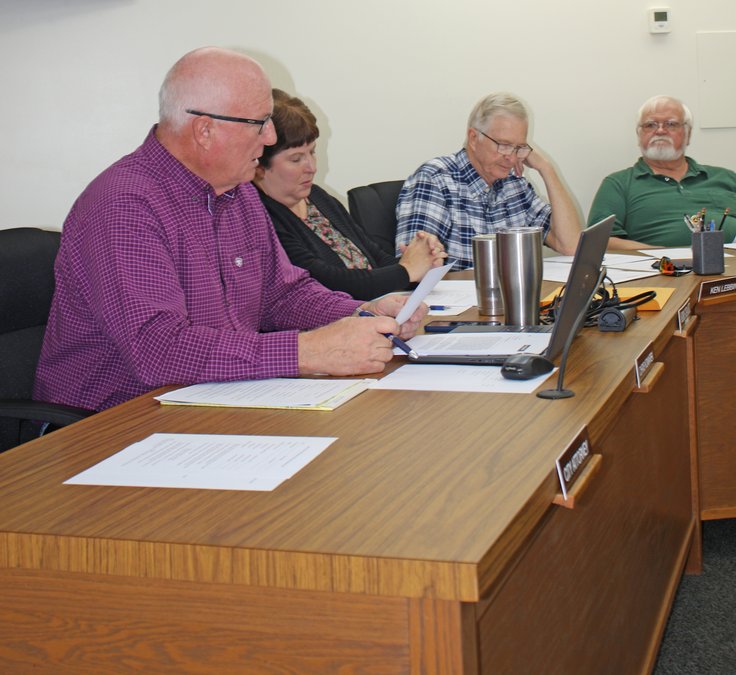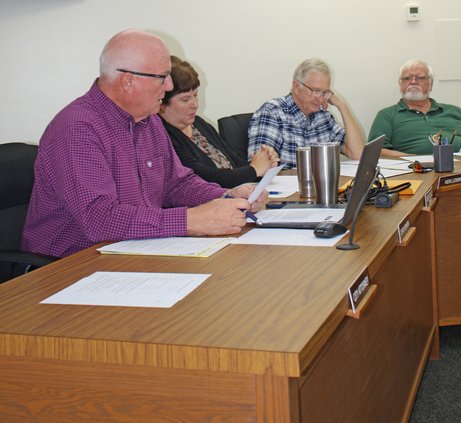ELLINWOOD — For the past quarter century, Ellinwood residents have benefitted from a city-operated trash service. Through the years, that service has paid for itself with a little left over.
Currently, the rates for bi-weekly curbside residential collection are $12 per month for both a 60 gallon and 90 gallon container. If a second container is requested it is an additional $3 per month. The rates for commercial customers are $13.20 per month for each 90 gallon container.
Business customers have the option to rent a three- or four-yard dumpster from the city or purchase their own. Rental rates are $16.50 and $19.75 per month, respectively. Collection rates depend on size and frequency of pickup.
However, the city’s current two trash trucks have been steadily aging, and the department is in need of a full-time department head with the resignation of Superintendent Brad Helfrich, noted City Administrator Chris Komarek. “It’s unfortunate, but we are probably looking at raising the rates just to keep what we have,” he said.
Monday evening, Komarek outlined the department’s current situation at a special work session of the Ellinwood City Council. He also provided a history of the service begun in 1998, with a record of financials that included past revenues, purchases, transfers and staffing that has kept the service running in a bi-weekly curbside pickup format.
“Issues in the solid waste department have come to the top rather suddenly among several projects we’re needing to spend some time on,” Komarek told the council. “We’re currently covering a position out of the power plant staff.
“But before we get somebody in that slot permanently, I want to be sure that we want to stay in this business,” he said. “My gut feeling is that we do. But financially, it may not make sense in the future.”
Beginning in 1997, the City of Ellinwood began thinking about a self-service alternative to the contracted trash service they were using, Komarek said. “We were renewing the contract every three years, which was a hassle,” he said.
“It was thought at the time we could do it ourselves, maybe do it as good and maybe, possibly, make some money at it,” he said. “Quite honestly, we have — just over the past maybe 10 years, not enough to keep up with where we need to be.”
In 1998, the city borrowed $104,000 and purchased a used rear loader for $22,000, a side loader for $35,000 and 1,100 containers for $45,000. The residential rate was kept at $9 a month. Two years later, an increase in tipping fees at the Barton County Landfill to $24 a ton led to an increase in monthly rates to $11.
A change in landfill policy in 2001 led to the establishment of a city-owned composting facility and the equipment purchases of a tractor and compost turner.
Loader replacements
A couple years later, the side loader was involved in a crash that totaled the truck. Another used side loader was purchased but lasted only until 2006. Another side loader was purchased for $148,000 from funds available. In 2009, the rear loader was replaced and was retired as a spare. The loader purchased in 2009 is still in service. With no available funds, the city borrowed $55,000 from the bank and $60,000 was taken from the city’s capital improvement fund.
The engine on the side loader gave out in 2014 and repaired at a replacement cost of $30,000 with assistance of a $25,000 loan from the bank. In June 2022 the transmission on the side loader was replaced, and in 2023, the council approved replacement of the rear loader transmission and staff is awaiting delivery.
Currently, the rear loader has more than 100,000 miles, while the side loader has 153,000. Komarek’s current concerns for the side loader is the operating arm, while seals on the compactor are leaking and the box floor needs replacement.
“Looking down the road, the thing that’s scaring me is the price of a new rear loader,” Komarek said. “Delivery is two years out and it would cost somewhere between $250,000-$300,000. We don’t have that much in the bank; that has me thinking about the budget for the future and what we need to do.”
A new side loader would be even more expensive, Komarek said. “What it amounts to is we’ve got two trucks that are likely to give up at about the same time.”
Council discussion
Komarek then shared the financial history of the department and the council discussed alternatives to the purchase of two new vehicles.
“Maybe we should have had another $100,00 in the bank going toward new equipment, but we don’t have it,” he said. “We have $30,000 in equipment reserve and that’s 10% of what a new truck costs today. In today’s world, $12,000-15,000 won’t even pay for a major repair.”
“Right now, we’re doing OK and I’m hoping for 2024 to be a better year. We can continue on like we are, but sooner than later, we’re going to have to do something.
Komarek gave the council two options:
“If we want to keep going, we need to get real serious about setting money back,” he said. “If a new truck costs $300,000 and we might have $50,000, we’d have to borrow $250,000. With the interest rate, we’d be paying on $50,000 a year plus interest, so that’s probably a six-year payment. We’d have to increase rates no less than $4 a month to make that payment going forward.
“So, if we buy one truck we won’t get for two years and then pay on it for six years, how old is the other truck going to be?” he said.
The other option would be moving to two rear loaders. “We could do that if we had two guys on the back of the rear loader, we could probably haul trash just as fast,” he said. “I don’t know if that would offset what we’re doing now. We should try and experiment with that some time in the future.”
A third option
The council and Komarek then debated going back to a contracted service. “The rates would still be going up, because whoever does it will want more,” Komarek noted. “We could sell the trucks off and hand the problem off to somebody else.”
The drawback would be the loss of the city’s personal touch to the service, he said. “We would lose being able to taking care of somebody ourselves, we’d lose that personal touch,” he said. “We would lose that convenience. But, we did it for years, before.
“Out of the cities that I looked up, a lot of them do contract their trash out. But I don’t think we’d be able to get a contractor in here to do it for less than $20 (pickup fee) a month,” he said.




